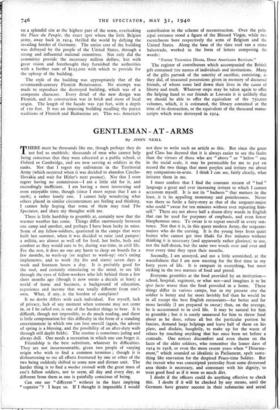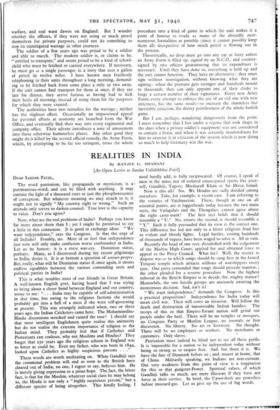GENTLEMAN - AT - ARMS
By JOHN NEILL
THERE must be thousands like me, though perhaps they do not feel so snobbish: thousands of men who cannot help being conscious that they were educated at a public school, at Oxford or Cambridge, and are now serving as soldiers in the ranks. Not that I regret my enlistment in the Territorial Army (which occurred when it was decided to abandon Czecho- Slovakia and wait for Hitler's next pounce). Not that I even regret having no commission—I am a little old for it, and exceedingly inefficient. I am having a most interesting and even enjoyable time, though (since I must repeat that I am a snob), a rather lonely one. I cannot help wondering what others placed in similar circumstances are feeling and thinking. I cannot help hoping that some of them may read The Spectator, and share my thoughts with me.
There is little hardship to grumble at, certainly now that the warmer weather has come. Things differ enormously between one camp and another, and perhaps I have been lucky in mine. Some of my fellow-soldiers, quartered in the camps that were built last summer, when it was decided to raise (and pamper) a militia, are almost as well off for food, hot baths, beds and comfort as they would care to be, during war-time, in civil life. For the rest, it does no one any harm to sleep on boards for a few months, to wash-up (or neglect to wash-up) one's eating implements, and to work (by fits and starts) seven days a week and fourteen hours a day. It is probably good for the soul, and certainly stimulating to the mind, to see life through the eyes of fellow-workers who left behind them a few short months ago (though it now seems a decade at least) a world of home and business, a background of education, experience and income that was totally different from one's own. What, if any, is the burden of complaint?
It no doubt differs with each individual. For myself, lack of privacy, lack of any moment when someone may not come in, or I be called out, is one of the hardest things to bear. It is difficult, though not impossible, to do much reading, and there is little compensation for this difficulty in the form of a standing entertainment in which one can lose oneself (again, the advent of spring is a blessing, and the possibility of an after-duty walk through still daylit fields). The routine is sometimes jading and always dull. One needs a recreation in which one can forget it.
Friendship is the best substitute, whatever its difficulties. They are not insurmountable, given two people of varying origin who wish to fmd a common terminus ; though it is disheartening to see all efforts frustrated by one or other of the two being suddenly shifted to some new and distant unit. The harder thing is to find a modus vivendi With the great mass of one's fellow soldiers, not to seem, all day and every day, as different from them as one is painfully conscious of being.
Can one say " different " without in the least implying superior "? I hope so. If I thought it impossible I would not dare to write such an article as this. But since the great god Class has decreed that it is always easier to see the faults than the virtues of those who are " above " or " below " one in the social scale, it may be permissible for me to put on record the two things that most perplex and irritate me about my companions-in-arms. I think I can see, fairly clearly, what irritates them in me.
I must confess that I find the constant stream of " bad " language a great and ever increasing irritant to which I cannot accustom myself. It is not its " badness " that matters in the least, it is its appalling monotony and pointlessness. Never was there so futile a fairy-story as that of the sergeant-major who could " swear for ten minutes without ever repeating him- self." There are not above half a dozen dirty words in English that can be used for purposes of emphasis, and even fewer blasphemous ones. To swear is to repeat oneself in every sen- tence. Not that it is, in this queer modern Army, the sergeant- majors who do the cursing. It is the young boys from quiet homes who cannot get into khaki for five minutes- without thinking it is necessary (and apparently rather glorious) to use, not the half-dozen, but the same two words over and over and over every time they open their mouths.
Secondly, I am annoyed, and not a little astonished, at the wastefulness that I am now meeting for the first time in my forty years of life. It is rampant in everything, but most striking in the two matters of food and petrol.
Everyone grumbles at the food provided by an institution— school, hospital, regiment, or what not—and imagines it to be ipso facto worse than the food provided in a home. These things differ in various camps, but in my present one the soldier is better and far_ more lavishly fed than he would be in all except the best English restaurants—far better and far more lavishly (I am prepared to swear) than, on the average, he is accustomed to in civil life. It may be natural for him to grumble ; but it is surely unnatural for him to throw foOd about as he does, refuse all but the -particular portion he fancies, demand large helpings and leave half of them on his plate, and disdain, haughtily, to make up for the waste of others by touching anything that has once been set before a comrade. One notices discomfort and even shame on the faces of the older soldiers, who remember the leaner days of 1914 to 1918, or even the more recent years when " Disarma- ment," which sounded so idealistic in Parliament, spelt sonic- thing like starvation for the despised Peace-time Soldier. But the recruit who was conscripted yesterday from some distressed area thinks it necessary, and consonant with his dignity," to treat gOod food as if it were so much dirt.
I doubt if the officers could do anything effective to check this. I doubt if it will be checked by any means, until the Germans have greater success in their submarine and aerial warfare, and real want dawns on England. But I wonder whether the officers, if they were not using so much petrol themselves for private purposes, could not do something to stop its unmitigated wastage in other journeys.
The soldier of a 'few years ago was proud to be a soldier and able to march. The modern soldier is, or claims to be, " entitled to transport," and seems proud to be a kind of school- child who must be fetched or carried everywhere. If necessary, he must go as a single passenger in a lorry that uses a gallon of petrol in twelve miles. I have known men fruitlessly telephoning to their units throughout a long morning, demand- ing to be fetched back from some place a mile or two away. If the unit cannot find transport for them at once, if they are late for dinner, they arrive furious at having had to kick their heels all morning, instead of using them for the purposes for which they were created.
The authorities have two remedies for the wastage ; neither has the slightest effect. Occasionally an impassioned appeal for personal efforts at economy are launched from the War Office, and eventually find their way into every regimental and company office. Their advent introduces a note of amusement into those otherwise humourless places. Any other good they might do is killed by the second official remedy, the Army Form, which, by attempting to be far too stringent, turns the whole procedure into a kind of game in which the unit makes it a point of honour to evade as many of the absurdly over- numerous formalities as possible (since it cannot possibly keep them all) irrespective of how much petrol is flowing out in the process.
Theoretically, no drop must go into any car or lorry unless an Army Form is filled up, signed by an N.C.O., and counter- signed by two officers guaranteeing that its expenditure is necessary. Until they have done so, everything is held up and the unit cannot function. They have no alternative: they must sign without investigation, without knowing what they are signing : when the pressure gets stronger and hundreds mount to thousands, they can only appoint one of their clerks to forge a certain number of their signatures. Every new Army Form, every attempt to enforce the use of an old one with new strictness, has the same result—to increase the shameless but inevitable cynicism, the dreary pointlessness of the whole foolish game.
But I am, perhaps, wandering dangerously from the point. I must remember that I live under a regime that took shape in the days when a private soldier's equipment was not considered to contain a brain, and when it was certainly insubordinate for him to exercise it in criticism of the system which is now doing so much to help Germany win the war.































 Previous page
Previous page